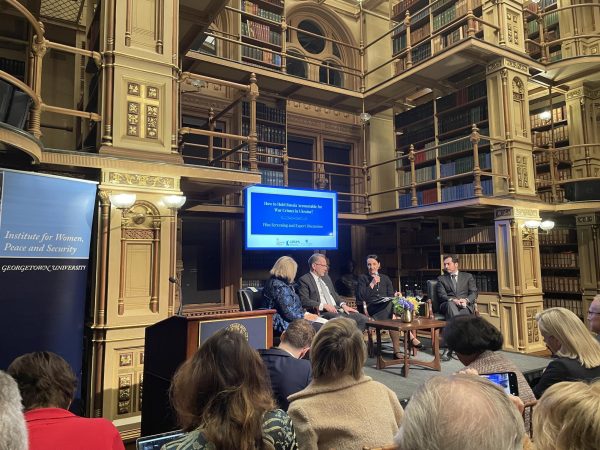CW: This article references and discusses war crimes against women and children. Please refer to the end of the article for on- and off-campus resources.
The ambassador to the United States from Poland and the first secretary of the Embassy of Ukraine joined experts in international affairs and Georgetown University faculty to commemorate the second anniversary of the Russia-Ukraine War at an event in Riggs Library on Feb. 7.
The Polish embassy partnered with the Georgetown Institute for Women, Peace and Security (GIWPS) and Vital Voices Global Partnership, a nonprofit dedicated to supporting women in leadership, to host the event. Organizers also screened a short documentary titled “TENETA”, showing accounts of Russian war crimes from witnesses and survivors.
Melanne Verveer, the former U.S. ambassador-at-large for global women’s issues and current director of GIWPS, said the two-year-long Russia-Ukraine War has caused immense death and destruction in violation of international law.
“It’s been almost two years now since Russia mounted its full-scale unprovoked assault on Ukraine, and it has brought enormous death and destruction to Ukraine and her people,” Verveer said at the event. “Civilians continue to be directly targeted in violation of international rules of law.”
Kateryna Smagliy, the first secretary of the Embassy of Ukraine, said Russia has committed numerous war crimes during the war’s two-year course, including sexual violence and violence against children.
“As we get closer to the second mark of Russia’s illegal and unprovoked attack in our country, mass killings, rapes, torture, filtration camps, illegal detention of civilians and children have become a cruel reality again in the 21st century,” Smagliy said at the event.
Ambassador Marek Magierowski of Poland, who discussed the investigation and recording of Russian war crimes by independent organizations, said technology like social media has made it easier to document the atrocities.
“Collecting and securing evidence of Russia war crimes is, with all due respect, easy, particularly in times of permanent surveillance and continuous digital exposure,” Magierowski said at the event. “To put it cynically, we do have the tools to monitor the atrocities carried out by Russians in Ukraine.”
Magdalena Gawin, a historian and director of the Raphael Lemkin Center for Documenting Russian Crimes in Ukraine — which interviews eyewitnesses and refugees fleeing Ukraine into Poland — said her team’s work focuses on lesser-known regions of Ukraine to better document and expose the war crimes.
“We also try, and from the beginning, to rather omit well-known towns or cities such as Kyiv or Bucha, which are full of journalists and are where everybody asks about the crimes,” Gawin said at the event. “We rather prefer those places where prosecutors couldn’t reach and where the problem is,” Gawen said.

Discussing the prosecution of Russian war crimes, Nema Milaninia, special advisor to the U.S. ambassador-at-large for global criminal justice, said the international community as a whole should acknowledge the crime of aggression.
“Unlike other crimes against humanity, the crime of aggression recognizes that everybody is a victim: every soldier who has had to fight, every house that has been destroyed, because the very character of the conflict is unlawful,” Milaninia said at the event.
Alyse Nelson, the president and CEO of Vital Voices Global Partnership, said women leaders helped organize when Russia invaded Ukraine but highlighted that women-led organizations were not receiving enough international funds.
“A network of women leaders stepped up,” Nelson said at the event “In a moment’s notice they expanded shelters from 60 people to 600 people within a week’s time. But of the billions upon billions of dollars that six months later started to flow in to help, less than 1% was going to women-led organizations.”
Geeta Rao Gupta, the current U.S. ambassador-at-large for global women’s issues, said Ukrainian women will play a key role in ending the conflict.
“To achieve sustainable peace, the women of Ukraine must be front and center,” Gao said at the event. “Women’s participation before, during and after conflict is critical to achieving lasting peace.”
Gao added that Congress, which has feuded over whether to increase aid to Ukraine, must continue to support Ukraine to maintain the United States’ image as a global superpower and bastion of democracy.
“The first step to holding Russia accountable for the horrors it has inflicted on Ukraine and her people is ensuring its war of aggression is met with defeat,” Gao said. “For this, Congress must act. Friends and foes alike are watching what we do and will draw lessons about American power and resolve.”
Resources: On-campus resources include Health Education Services (202-687-8949) and Counseling and Psychiatric Services (202-687-6985); additional off-campus resources include the Crisis Text Line (text 741741).








